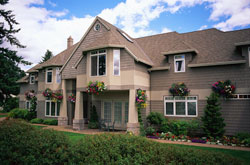Heating with Green
See if We Have Top-Rated
Green Heating in Your Area

These days, being environmentally conscious is on everyone's minds. Though there are certainly different schools of thought on which elements of energy conservation are the most important and what methods are going o be the best for us all in the long run, everyone can agree that consuming less is a goal worth setting. Since much of the energy consumption in a residence goes to central heating and hot water, it stands to reason that improvements in these areas will have a noticeable impact on how much energy an individual home wastes. While alternative heating systems are not yet "the rage" and many green heating options are not yet viable for every homeowner, in many instances, these non-conventional systems and techniques are worth looking into.
Do Alternative Heating Systems Save Money?
Even those who aren't particularly concerned about the environment must admit that certain green heating options are worth further examination for their financial benefits, alone. Despite the relatively high initial cost of many alternative heating systems, their low-operating costs can make them a bargain in the long run. However, not all alternative heating systems are going to make a significant financial impact in every situation.
There are several factors that will determine whether or not certain green heating options are right for you. The climate you live in, the system you choose, the availability of alternative fuels, and the overall difficulty of implementing a particular system in your home will each play an important role in whether or not one heating method will be a money saver for you. Professional advice and specific calculations are essential in determining the real-life savings any alternative heating system is likely to bring in a given situation, so make sure that you have a knowledgeable professional to consult with before you jump on the bandwagon!
Common Green Heating Options
While the best known green heating options are probably geo-thermal heat pumps and solar-powered electric heat, these are not the only alternative heating systems available for today's homeowner. Radiant floor heating, passive solar design, and pellet stoves can also provide very efficient heating in the right situation; even conventional fuels like natural gas can provide extremely eco-friendly heating when used in the proper environment!
Supplementing Alternative Heating Systems
Whether you and your contractor decide to install radiant floor heating or a geo-thermal heat pump, or you end up opting to simply replace your existing furnace or boiler with a government certified Energy Star model, the best thing you can do to make your home more energy efficient is to use that system as little as possible. This doesn't mean you need to freeze during the winter, though!
Trying to stay warm? Use this link to hire a
Heating Professional!All green heating options are most effective when placed in an environment that holds onto heat, produces its own heat, or both. In many cases, one of the biggest factors in making your central heating more efficient is the insulation in your walls rather than the furnace in your basement. Along with an energy efficient heating unit, good insulation coupled with optimal window placement (known as "daylighting") creates the best path to a truly eco-friendly home. Though this approach is a bit more round-about than simply swapping your existing furnace for a more efficient one, the results are second to none.
Designing Around Alternative Heating Systems
The best heating systems (alternative or conventional) are those that are paired with proper home design. In the best case scenario, you would actually design your home to compliment your heating, cooling, plumbing, and other systems. When building from scratch, this is done by choosing the right materials, creating the most optimal floor plan, putting the structure on the right piece of land, and using the elements that naturally occur there (like wind, running water, and sun exposure) to your advantage. When designed right from the start, some green builders have created houses that require almost no supplemental energy to keep indoor temperatures comfortable!
The bottom line is: the most energy efficient heating systems vary dramatically from situation to situation. When you consider that even a coal or wood stove can be considered efficient when coupled with the right home design, it's plain that the structure you are heating is nearly as important as what you heat with. If you want to truly make your home more energy efficient (and save some big bucks down the road, as well), don't cut corners! Talk to a professional who specializes in reducing energy consumption about any new heating system you plan to install, but also about any other things you can do to your property to make heating less of a strain on the environment.
More Tips & Advice For Your Home
- Related Articles
-
- Recent Articles

